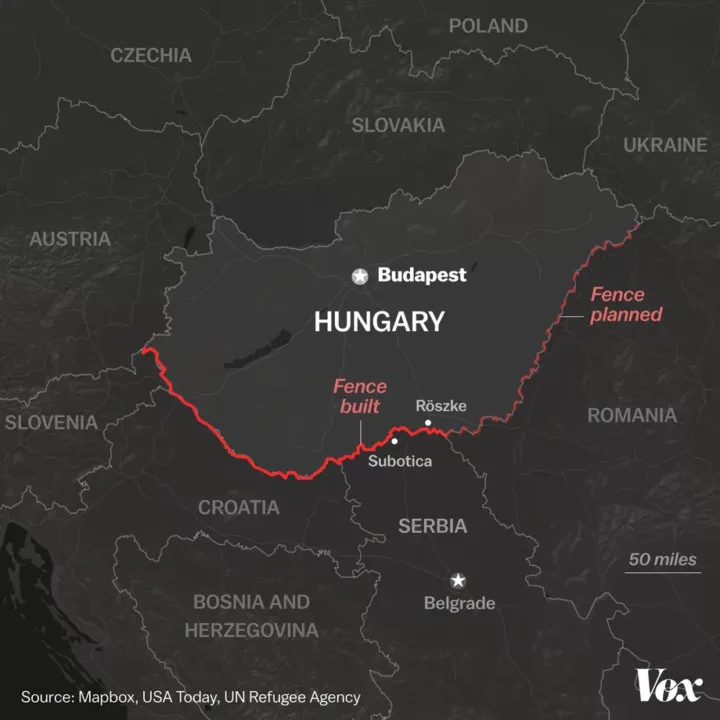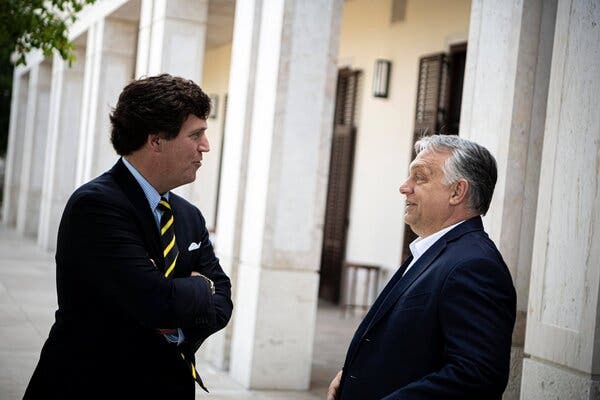Trumpworld and Fox News Tout Hungary’s ‘Soft Fascism’ as a Blueprint for America’s Future
Though on the surface a Euro-democracy, Hungary under autocrat Viktor Orban has dismantled democratic norms much like Donald Trump tried. Fox News approves.
Budapest
Just what was that serial purveyor of misinformation, Tucker Carlson of Fox News, doing in Budapest, Hungary, last week? Taking in the old world charm and classic architecture of an iconic world capital? Tracking down an awesome bowl of genuine Hungarian Goulash?
None of those, of course. Carlson was in the Hungarian capital to speak at a conference that the New York Times described as a plan to “train a conservative future elite” and establish Budapest as the ideological center of an international conservative movement. The Hungarian government funded the conference, courtesy of its “prime minister,” Viktor Orban.
Oh yes, that fellow, Viktor Orban. Carlson and other conservatives, including ex-White House aide Steve Bannon, were there to pay tribute to the Hungarian leader-for-life. The fact that Orban does not have to face tough elections, a luxury that eluded Donald Trump, is one reason why the conservatives present rendered lavish praise on their host.
In fact, on a live broadcast from Budapest, Tucker Carlson uttered this bizarre comparison between an authoritarian state and the good old USA: “we’ve read many times how repressive Hungary is…That’s not just wrong, it’s insane…Let’s say you live in a big American city and you publicly attack Joe Biden’s policies…If you kept talking like that, you would likely be silenced by Joe Biden’s allies in Silicon Valley. If you kept it up, you might have to hire armed bodyguards…But [that] is unknown in Hungary…Opposition figures don’t worry they’ll be hurt for their opinions…Orban regularly drives himself with no security. so who is freer?”
Let’s see if that holds up in the real world.

Viktor Orban Builds a Wall
Viktor Orban is quite open about his mission to undermine the concept of western democracy. He seems determined to replace it with a word salad of “illiberal democracy” or “Christian democracy.” Orban regards diversity and multiculturalism as at odds with his vision of a “Christian family model.”
These phrases and ideas should be familiar to any American who endured four years of Donald Trump. One obvious example is Orban’s opposition to immigration for all the wrong reasons about cultural purity. In 2015, Hungary began building a wall at the height of a migrant crisis with its neighbors to the south with large Muslim populations. A second fence was built in 2017.

What followed should have a ring of familiarity to Americans: Prime Minister Orban asked the European Union to pay for half of the construction of the wall, arguing that Hungary was “protecting all of Europe from a flood of illegal immigrants.” The cost: $469 million.
The EU’s response was similar to Mexico’s answer to President Trump: No. “We have only recently taken down walls in Europe,” explained the EU, “and we should not be putting them up.” The EU put an exclamation point on its opposition by initiating “infringement proceedings” against Hungary for its harsh treatment of asylum-seekers.
Orban’s Journey
After decades in the Soviet bloc, Hungary made a successful transition starting in 1990 from Soviet communism to European democracy. Viktor Orban was elected prime minister in 1998 and governed as a conventional European conservative. But in 2002, his party Fidesz was defeated by the Socialist Party.
Orban’s reaction to the loss perhaps created a playbook for a future US president. Orban and his followers accused the Socialists of–you guessed it–election fraud. He attacked the media for not being sufficiently receptive to the Fidesz message. (“Fake news!”) Orban ran again in 2006 but lost. But serendipity smiled on Orban in 2010 when Fidesz won a “constitutional majority”…enough seats in Parliament to make big changes, like, say, rewriting the constitution.

‘Soft Fascism’ in Hungary
Soft fascism: “a political system that aims to stamp out dissent and seize control of every major aspect of a country’s political and social life without needing to resort to ‘hard’ measures like banning elections and building up a police state.”
“The fact that Hungary holds elections enables [conservatives] to pretend that Hungary is still a democracy,” writes Heather Cox Richardson, distinguished historian and professor at Boston College.
Orban and his supporters got busy altering Hungary’s constitution to keep them in power in perpetuity. See if these ring a bell:
Gerrymandering. Parliamentary districts were redrawn by a well-known technique used by the GOP “with surgical precision” called “packing.” Urban liberals were packed into a handful of parliamentary districts which were greatly outnumbered by sparsely populated districts in Hungary’s conservative countryside.
Politicization of government. Constitutional changes gave Fidesz new authority to be the government’s human resources department. Professional civil servants were fired en masse, replaced by Orban loyalists in vital positions, like elections supervision.
Targeting independent media. Newspapers, broadcasters and other media outlets were vilified as peddlers of false information and for being unpatriotic. Vox has a good take on this:
Fidesz used the power of the state to pressure private media corporations to sell to the state or to oligarchs alligned with Fidesz. Tactics included withholding government advertising dollars, selectively blocking mergers that would allow outlets to expand and imposing punitve taxes on ad revenue.
By 2017, 90 percent of all media in Hungary was owned by the state or a Fidesz ally…This media empire included every single regional newspaper in the country.
Vox
Heather Cox Richardson: “While Hungary still has elections, state control of the media and the apparatus of voting means that it is impossible for Orban’s opponents to take power.”
When the coronavirus pandemic imposed lockdowns all over the world, Hungary’s Parliament passed a law permitting Viktor Orban to “rule by decree.” That state of emergency was lifted by the summer, but some say Orban’s powers remain intact.

Implications for America
The good news is that the US has a much longer tradition of democracy than Hungary: 235 years versus 20 years. America’s democratic resilience has been tested by a Civil War and most recently, by a coup attempt by an ex-president who lost an election fair and square.
Speaking of that ex-president, Donald Trump tried mightily to vilify the media, more than once calling it “the enemy of the people.” But media in the US remain free and robust, its shrinkage dictated by changing tastes and technology, not by anti-democracy forces. The First Amendment has proven durable and cherished.
However, the aspirational linkage between Fidesz and the Republican Party is worth monitoring. A majority of GOP legislators were just fine with an outright attack on America’s seat of government, shoving aside the American Experiment in exchange for campaign cash and the adoration of the white grievance crowd. The Republican attack on voting rights, especially its push for partisan election administration, remains the number one existential threat to US democracy. Look at what happened in Hungary.
Competence
Speaking about the Jan. 6 attack on the Capitol, it was shocking, unprecedented and outrageous…and also damn pathetic. After weeks of sampling wildly implausible conspiracy theories, getting laughed out of over 60 courtrooms in the country, Giuliani’s hair dye and zombie-eyed attorneys, and failing to prove even one instance of voter fraud, Trump played his final card: a lynch mob of right-wing extremists on Jan. 6. Trump was okay with doing the unthinkable but didn’t know how. Two hundred plus years of democracy proved too formidable a foe.
The point is, Donald Trump is no Viktor Orban. Somewhere out there in conservative circles, there is a man or woman who had no allegiance to democracy, who is able to accumulate political power and who is just as wily as the Hungarian strongman.
There’s your threat. Vigilance required.


















































































































